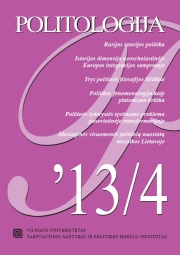POLITIKOS FENOMENOLOGIJA KAIP PLATONIZMO KRITIKA
POLITICAL PHENOMENOLOGY AS A CRITIQUE OF PLATONISM
Author(s): Simas ČelutkaSubject(s): Politics / Political Sciences
Published by: Vilniaus universiteto leidykla & VU Tarptautinių santykių ir politikos mokslų institutas
Summary/Abstract: The paper examines the phenomenon of politics as a distinctive domain of practical experience, particularly focusing on the analysis of political space and political time. Along with this, other political aspects are taken into account, such as desire and lack, interest, action, deliberation, judgment, fragility, and freedom. Political phenomenology is contrasted with the notion of politics expounded in Plato’s “Republic”, which centres around the famous Analogy of the Cave. According to the Analogy, the fundamental precondition of political knowledge is a deliberate delocalization – a philosopher’s dissociation from all time-bound factors and the existing political reality which is conceived as a prison of unstable, unreliable “shadows”. The paper suggests that the application of platonic Forms to political life is inadequate, because politics is an essentially temporal, fragile realm. Politics is “nourished” by the past and historical precedents, and also by future, through political aims and visions. Therefore, historical prudence, practical experience and intuition are considered of more relevance for a political subject than theoretical definitions and abstractions. It is argued that the phenomenon of politics has its own specific structure of functioning: it has no need to “borrow” any immutable principles from metaphysicians. Metaphysics does not possess an exclusive access to political knowledge. Objections to Platonism are based on the insights of Aristotle, Hannah Arendt, Michael Oakeshott and some other important political thinkers. Aristotle valuably distinguishes between theory and practice, situating politics in the realm of the latter and thus restoring dignity to the “cave-dweller” and his common sense. Arendt skillfully elaborates on the aspects of fragility of a political action, as well as on conceptualizing the experience of freedom as essential to political life. Furthermore, the paper draws heavily on Arendt’s distinction between rational truth and politics. It is argued that the two are mutually incompatible or even in conflict, because politics allows only for opinions and persuasion, whereas the unchangeable rational truth is conceived as coercive in nature. On his part, Oakeshott provides arguments for the importance of prudence and historical understanding, while also criticizing Plato’s “demonstrative” science of politics. These and a few other lines of reasoning are invoked to account for an inappropriateness of using the Cave Analogy for the understanding of politics.
Journal: Politologija
- Issue Year: 2013
- Issue No: 4 (72)
- Page Range: 92-118
- Page Count: 27
- Language: Lithuanian

